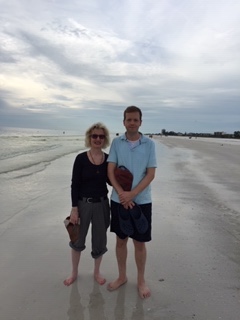
It’s been fifteen years since Chris was first hospitalized and more than that since he began to show symptoms of psychosis.
Today’s is my last post.
Thank you friends and readers for joining this blog and sticking with us. I started this blog in 2009, and recently welcomed my 150th follower. Thank you for your comments, thank you for personally getting in touch with me and sharing your own stories.
Chris is much older than when we started out and I’ve said and done all that can be said and done. The blog will still be here for reference and entertainment purposes only. My New Year’s project is to improve the categorization of my posts to make the blog more accessible. Pick a post, any post, and you may find something informative or just fun to read. If you would like a condensed version of the journey, do consider purchasing my book. I can guarantee, you’ll love it.
Just when I thought Chris had plateaued, something surprising happened. Chris’s motor tics have greatly diminished. I’ve noticed, too, that he is taking more initiative, such as going regularly to the gym and by speaking up for himself. The newfound initiative is a welcome sign because the negative symptoms of schizophrenia (motivation/initiative) are the hardest to treat and are what keeps most people with serious mental illness from working or studying.
This sudden shift appears to have been caused by his being prescribed an antidepressant back in August for his OCD symptoms (in addition to the Abilify he has been taking on and off at low doses for years). We learned that an antidepressant could reduce the tics. I’m now wondering if his problem all along has been some form of OCD and underlying depression that got labelled schizophrenia. These labels (and the drugs that are prescribed to treat the symptoms) are increasingly interchangeable (but not always effective).
Here’s what I know after fifteen years, and it’s not much. The treatment for what is called serious mental illness is woefully hit and miss. Nobody “gets” it. Psychiatrists haven’t much of a clue about what to do, and, despite years of trying, neither have I. We are at the mercy of the latest research results that may or may not help our relative. I had understood for many years that antidepressants were not recommended for schizophrenia, as it was thought that they could drive the person into mania. My husband was all in favor of trying one, Dr. Stern and I were not. Nobody even raised the possibility of OCD in Chris’s case.
I had no idea that motor tics were a sign of OCD and I’m guessing that this nugget of information is something that has come out only within the past decade. I recently stumbled across a page from the Mayo Clinic linking motor tics to an underlying symptom of schizophrenia. (Never heard that one before. Have you?)
I don’t know if these promising changes will last. Who knows what Chris’s future holds? I’m optimistic. He’s has a lot to give.
Parting thoughts
- Trying anything is usually better than trying nothing. (In my experience, all interventions, coming from a place of love, lead to small improvements).
- Learning good communication skills is essential.
- Be an advocate for your relative. When it comes down to it, you’re on his side, not the doctor’s. Leave no doubt that you want what your relative wants and you will try your best to make it happen.
- Holidays bring added stress.
- Drugs have their place, but keep them as low as possible and never stop searching for a drugless alternative.
- Not all doctors are automatically wrong. Be open to what they have to say.
- Take an interest in this most intriguing condition. Enjoy the mystery.
- Lighten up. The journey has its moments.
- Look after your own health.
- Live in the moment.
Someone who did have a clue about what is called mental illness was author Hermann Hesse, my go-to person for his reflections about journeys and discovery. Chris and I leave you with this:
“One must find the source within one’s own Self, one must possess it . Everything else was seeking — a detour, an error.”
― Hermann Hesse, Siddhartha
